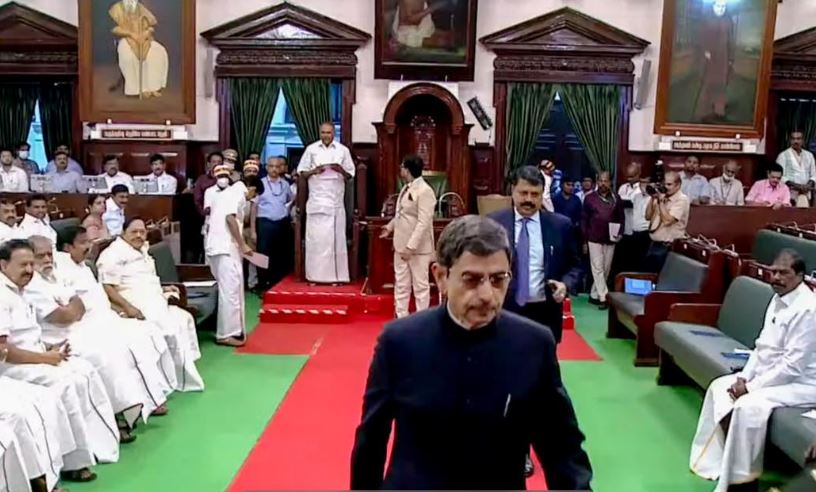Playing the national anthem at important government events reinforces a sense of collective identity, unity, and patriotism among citizens. It is a symbolic reminder of shared national values and aspirations beyond regional, linguistic, and cultural differences. Under the Prevention of Insults to National Honour Act, 1971, deliberate insult or contempt of the national anthem is punishable by imprisonment of up to 3 years, a fine, or both. Not playing or singing the national anthem is not punishable unless it is a deliberate disrespect. In 2019, the Madras High Court dismissed a petition seeking punishment for not playing the national anthem at an official function, citing the lack of a legal mandate to enforce its singing or playing on all occasions.
Tamil Nadu Governor R.N. Ravi walked out of the Tamil Nadu Assembly without delivering his customary address. The governor’s departure was in protest against the national anthem not being played before his scheduled address, which he considered necessary. Tamil Nadu Governor R.N. Ravi walked out of the House without delivering the inaugural address of the first session of the year in the Assembly. He said that the national anthem was not played before his speech. Last year too, he had refused to read out his address. The state anthem is played first in the Tamil Nadu Assembly. The session begins with the playing of the state anthem, Tamil Thai Vaazhathu, and finally the national anthem. The national anthem is played after the governor’s address. This practice has been in place since July 1991, which was started during the Jayalalithaa-led government. Earlier, the governor used to deliver his address without any national anthem. Governor R.N. Ravi walked out of the Assembly without delivering his address, saying that only the state anthem was played on his arrival and not the national anthem. He said it was an insult to both the Constitution and the national anthem. In Nagaland, the national anthem was not played in the assembly for decades, and it was introduced only in February 2021 during R.N. Ravi’s tenure as governor. In Tripura, the national anthem was played in the assembly for the first time in March 2018. Assemblies of other states do not follow strict protocols for playing the national anthem. Respecting the national anthem has been described as a fundamental duty of every citizen. However, this does not make it compulsory to sing or play it on specific occasions.

During the President’s address to Parliament, the national anthem is played when the President arrives on the dais. During the address, the President reads out the printed address, followed by a second version, if necessary, which is read out by the Chairman of the Rajya Sabha. After the address, the national anthem is played again before the president leaves the hall. The Constitution of India regarding respect for the national anthem Article 51(A)(a) under the Fundamental Duties mandates every citizen to abide by the Constitution and respect the national anthem, the national flag, and other national symbols. Home Ministry orders specify the occasions when the national anthem should be played, such as during civil and military investitures, parades, the arrival/departure of the President or Governor, and ceremonial state ceremonies. What has been specified about playing the national anthem on special occasions? The national anthem should be played in full. During civil and military investitures. When the national salute is given to the President or Governor. During parades, hoisting of the national flag or regimental color presentations. When the President arrives or leaves from ceremonial state ceremonies. Before and after the President’s address to the nation on All India Radio. Courts have observed that the national anthem deserves respect, but its singing or playing is not compulsory on all occasions unless explicitly specified. For example, during cinema screenings, the Supreme Court has ruled that playing the national anthem is not compulsory but should be encouraged.
Under the Prevention of Insults to National Honour Act, 1971, intentional insult or contempt of the national anthem is punishable with imprisonment of up to 3 years, a fine, or both. Not playing or singing the national anthem is not punishable unless it is a deliberate disrespect. In 2019, the Madras High Court dismissed a petition seeking punishment for not playing the national anthem at an official function, citing a lack of legal mandate to enforce its singing or playing on all occasions. Mass singing is required on occasions such as hoisting the national flag. Any cultural or ceremonial function (other than a parade). Arrival and departure of the president at government or public functions. Isn’t playing the national anthem mandatory at official functions? For example, during a function held in Madurai in 2019 attended by the Prime Minister, Tamil Nadu Governor, and Chief Minister, the national anthem was not played. The Madras High Court dismissed a petition seeking punishment for not playing the national anthem. The court said that the use of the national anthem was customary and not mandated by law.
Playing the national anthem at important government events reinforces a sense of collective identity, unity, and patriotism among citizens. It is a symbolic reminder of shared national values and aspirations beyond regional, linguistic, and cultural differences.
Making the national anthem compulsory is in consonance with Article 51(A)(a) of the Constitution, which enshrines the fundamental duty of every citizen to respect the national anthem. Its inclusion in major events underlines the importance of respecting national symbols and promoting a culture of respect and accountability in public life. The government should issue clear and consistent guidelines for playing the national anthem at official events to avoid confusion and ensure uniformity across states and institutions. Promote awareness and respect, run awareness campaigns stressing the importance of the national anthem as a unifying symbol, and promote voluntary respect and participation without compulsion or controversy.







